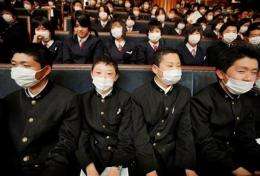WHO: No swine flu vaccine available for months (Update)

(AP) -- Drug manufacturers won't be able to start making a swine flu vaccine until mid-July at the earliest, weeks later than previous predictions, the World Health Organization said Tuesday. It will then take months to produce a new vaccine.
The disclosure that making a swine flu vaccine is proving more difficult than experts first thought came as U.N. Secretary-General Ban Ki-moon and WHO chief Dr. Margaret Chan met Tuesday with representatives from about 30 pharmaceutical companies to discuss the subject.
After the meeting, Ban declared that solidarity was the key to resolving the swine flu outbreak, urging governments to make sure all countries have access to drugs and vaccines. He also said virus samples and flu data must be shared and "self-defeating" measures like trade and travel bans should be avoided.
"We do not yet know how far and how fast it will spread, how serious the illness will be and, indeed, how many lives will be lost," Ban told WHO's annual assembly in Geneva. "Global solidarity must be at the heart of the world's response."
"(It) must mean that all have access to drugs and vaccines," he said.
Health officials from around the world are meeting here this week to discuss the outbreak that has infected 9,830 people in over 40 countries, killing at least 79 of them.
According to vaccine experts convened by WHO, swine flu virus is not growing very fast in laboratories, making it difficult for scientists to get the key ingredient they need for a vaccine, the "seed stock" from the virus, the agency reported.
Previously, WHO officials had estimated that production could start in late May, and would take four to six months.
Experts also found no evidence that regular flu vaccines offer any protection against swine flu.
Vaccine experts estimated under the best conditions, they could produce nearly 5 billion doses of swine flu vaccine over a year after beginning full-scale production.
In that situation, the U.N. might have access to up to 400 million doses for poor countries. The rest of the vaccines would presumably go to wealthy countries who have already signed vaccine deals.
Mass producing a pandemic vaccine would be a gamble, as it would take away manufacturing capacity for the seasonal flu vaccine that kills up to 500,000 people each year. Some experts have wondered whether the world really needs a vaccine for an illness that so far appears mild.
Chan said it would be impossible to produce enough vaccine for all 6.8 billion people on the planet - a situation that could set off a global scramble where rich countries outbid poorer nations for the vaccine.
The impact of a pandemic - a global epidemic - is expected to be worse in poor countries, where people with other diseases like AIDS and malaria are more susceptible to swine flu and national health systems are less able to respond.
U.S. Health and Human Services Secretary Kathleen Sebelius said Tuesday the U.S. felt it had a responsibility to ensure that both antiviral drugs and any new vaccine are also available to poor countries. Unlike other countries such as Britain, the United States has so far refrained from reserving its share of any new vaccine.
The United States is working to boost its production capacity for seasonal flu vaccines so in the event of a global outbreak those factories can switch to the pandemic swine flu strain, she said.
"At this point we have not placed orders for vaccine," Sebelius told reporters in Geneva. "There is still so much uncertainty about this virus that it is really premature for us to even make a determination of how many people would appropriately be vaccinated, in what order, how many doses would be required, and at what point."
These are the issues Ban and Chan discussed with vaccine makers, including top producers Novartis, Sanofi-Aventis, GlaxoSmithKline and Baxter International as well as drugmakers from developing countries.
One expert, however, thought 5 billion doses estimate was too optimistic.
"We should go forward with production as quickly as possible, but we should be cautious" about predictions, said David Fedson, a vaccine expert and former medical professor at the University of Virginia. "We just don't know what the numbers will be until manufacturers start working with the virus."
He also wondered about political issues involving vaccine distribution - saying he was not sure if countries with vaccine plants would be willing to ship pandemic vaccines elsewhere before all of their own citizens were vaccinated.
On Monday, dozens of governments lobbied WHO to tread carefully before next raising its swine flu alert to the highest pandemic level of phase 6. The level currently stands at phase 5 - saying a global outbreak is "imminent."
Britain, Japan, China and others said Monday that declaring a global outbreak could cause unnecessary panic and confusion, especially since the virus has turned out to be less deadly than feared.
The vaccine experts emphasized that WHO's declaration of a pandemic should not automatically force vaccine makers to switch from making regular flu vaccine to pandemic vaccine. In addition, they said even if swine flu vaccine production began, that did not mean that countries should start immunizing large groups of people.
The experts told WHO that it should come up with targeted advice on which groups of people need the vaccine the most and should get it first. They also planned to meet again in several weeks to decide whether large-scale production of swine flu vaccine should begin.
Since the outbreak began last month, 79 people have died from the disease - 72 in Mexico, five in the U.S., one in Canada and one in Costa Rica, WHO says. Another U.S. death - that of a 16-month-old - is being investigated for swine flu.
On the Net:
WHO: http://www.who.int
©2009 The Associated Press. All rights reserved. This material may not be published, broadcast, rewritten or redistributed.

















